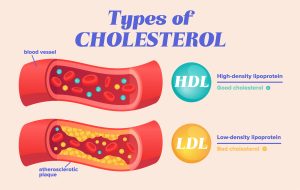
According to the Centers for Disease Control and Prevention (CDC) nearly 94 million adults over age 20 have what can be considered borderline high cholesterol. But what does that really mean?
Cholesterol is a waxy, fat-like substance (lipid) that’s in your body. It’s used for several functions, including producing hormones, and it can also play a role in heart health.
There are two main types: high-density lipoprotein (HDL), or “good cholesterol,” and low-density lipoprotein (LDL), or “bad cholesterol.”
HDL is potentially helpful and productive to heart health because it absorbs cholesterol in the blood and veins and carries it back to your liver. LDL can be potentially harmful because it can accumulate on blood vessels walls, stiffen arteries, and limit blood flow space.
Most people associate cholesterol with the food they eat. But your body produces it naturally, and you’re going to have it whether you eat it or not. Genetics may be the most significant factor in overall cholesterol.
What you eat, in fact, probably plays way less of a role than you might think. The amount of cholesterol in your diet has little impact on cholesterol levels. Instead, high-sugar foods tend to have a greater impact, prompting the liver to create more LDL.
Either way, your body is making cholesterol independently whether or not you’re eating it.
In recent years, doctors have moved away from “hard and fast” cholesterol levels and consider them more in the context of a person’s overall health. Elevated cholesterol may be more concerning if a person has high blood pressure, diabetes, or other heart disease risk factors.
Eating a diet that prompts your body to produce more HDL and less LDL may make a difference in cholesterol levels or at least improve the ratio of HDL/LDL in your blood. Foods that may help accomplish this are nuts, avocado, and fatty fish.